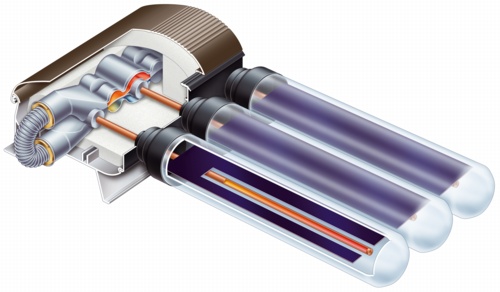Beyond the boiler

Adding solar thermal to existing buildings and boiler systems is an efficient option for property owners who want to reduce carbon emissions and take advantage of the Renewable Heat Incentive says Firat Ucer.
In an ideal world, a heating system is designed at the outset in conjunction with the building itself, following a thorough analysis of overall energy requirements and structural possibilities. However, many commercial property owners, motivated by policies such as the Renewable Heat Incentive (RHI), are now rightly investigating how existing heating systems can be improved for increased efficiency by retrofitting solar panels. But what questions need to be asked of the property and how does solar ‘bolt on’?
In most cases solar thermal is a perfect option for generating a large proportion of hot water for free where it can be a lead or supporting renewable heat source to a heat pump or biomass boiler. With the RHI, it will earn savings too. For example, an office block with an annual heat demand of 300 000 kWh for space heating and 10 000 kWh for hot water, where solar provides 50% of the overall hot water requirement, could save £17 300 over 20 years. £6400 is from fuel savings compared to the gas alternative, and £10 900 is attributed to RHI payments of 8.5 p per kWh.
Key criteria for solar
Every building is different — the way it has been constructed, its location, its heating and hot-water requirement and the space it has available for plant and hot water storage. Building owners need to ask if there sufficient space to house the new equipment or if there is enough footprint to build a new plant room?
Many properties lack sufficient surface area on which to lay the required number of solar collectors or they can suffer from too much shade. It is not just space for the panels themselves that is important. There needs to be a safety perimeter in which the installer can work plus room for safety cables. Access for scaffolding is also important.
Nowadays there are flexible solar collector products opening up the market to include properties without flat areas. Viessmann’s Vitosol 200-T solar heat-pipe system, for example, offers universal application in any location. It can be laid flat on roof tops or on walls or freestanding — vertically or horizontally. Individual tubes can be rotated for optimum alignment with the Sun and replaced without having to drain the system.
Retrofitted solar systems
In almost all cases, solar thermal can be fitted to be used in conjunction with an existing boiler. Solar-heated hot water feeds into the main cylinder via a new pre-heat cylinder. The main cylinder draws hot water from the boiler only when required, for example to bring the temperature up to 60°C to comply with legionella guidelines or to cope with heavy water usage. The new system is programmed so that solar takes the lead whenever possible.
Where more than 2,000 l of hot water per day is required, such as in leisure centres or residential homes, the inclusion of external plate heat exchangers is recommended.

At Botwell Green Leisure Centre in London, 32 Vitosol solar panels (96 m2 in all) produce 647 kWh/m2 per year to provide hot water for showering. Efficiency of the solar-thermal system is maximised by the use of heat exchangers — one prior to the buffer cylinder and one after. The plates create additional large heat transfer areas which maintain water temperature and boost system efficiency by demanding less of the gas boiler.
The buffer cylinder has to be large enough to maximise system efficiency. Too small and there will be insufficient storage capacity for the harvested heat. Too large and the system will be expensive and the heating loss will be greater. A well insulated cylinder designed for use with solar is essential. The heating-system manufacturer will be able to advise the correct size.
Weather compensation controls
Another way to increase efficiency is to install weather-compensation controls. They are easily retrofitted, as long as they can be connected to a 3-port valve. Weather compensation works by ensuring that the boiler burns the exact amount of fuel required to match the heat lost from the building, which depends on the outside temperature. The building will always be at the desired temperature) and never too hot or too cold. Depending whether the boiler is condensing or non-condensing, a sensor is fitted inside or outside the boiler, respectively.
Existing boiler efficiency
When property owners review their overall energy efficiency and consider investing in renewables, it is common and very sensible to review the boiler at the same time. The solar element of the heating system typically supplies 30 to 40% of the hot water requirement. Most of the hot-water requirement is met by the boiler, which therefore has a significant role to play in improving overall efficiency.
We can run calculations to show how replacing an old gas or oil, non-condensing boiler with 65% with a modern high-efficiency boiler having weather compensation controls and 90% efficiency can return impressive savings, in conjunction with solar, over the 20 year RHI payback period. For example, a school keeping its non-condensing boiler could have a total cost of £564 700 (including service) after 20 years. Upgrading to a condensing boiler would save £170 600.
Firat Ucer is national specification manager for renewable products with Viessmann.







